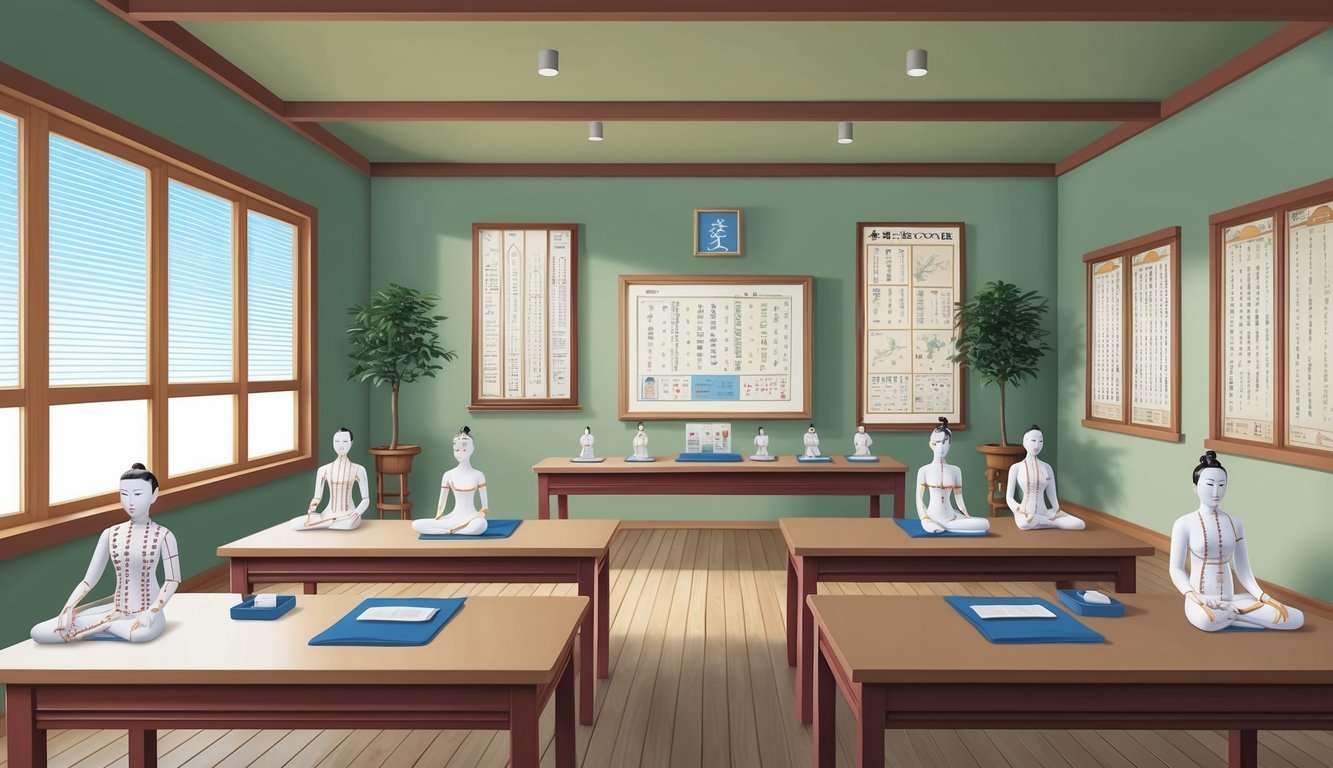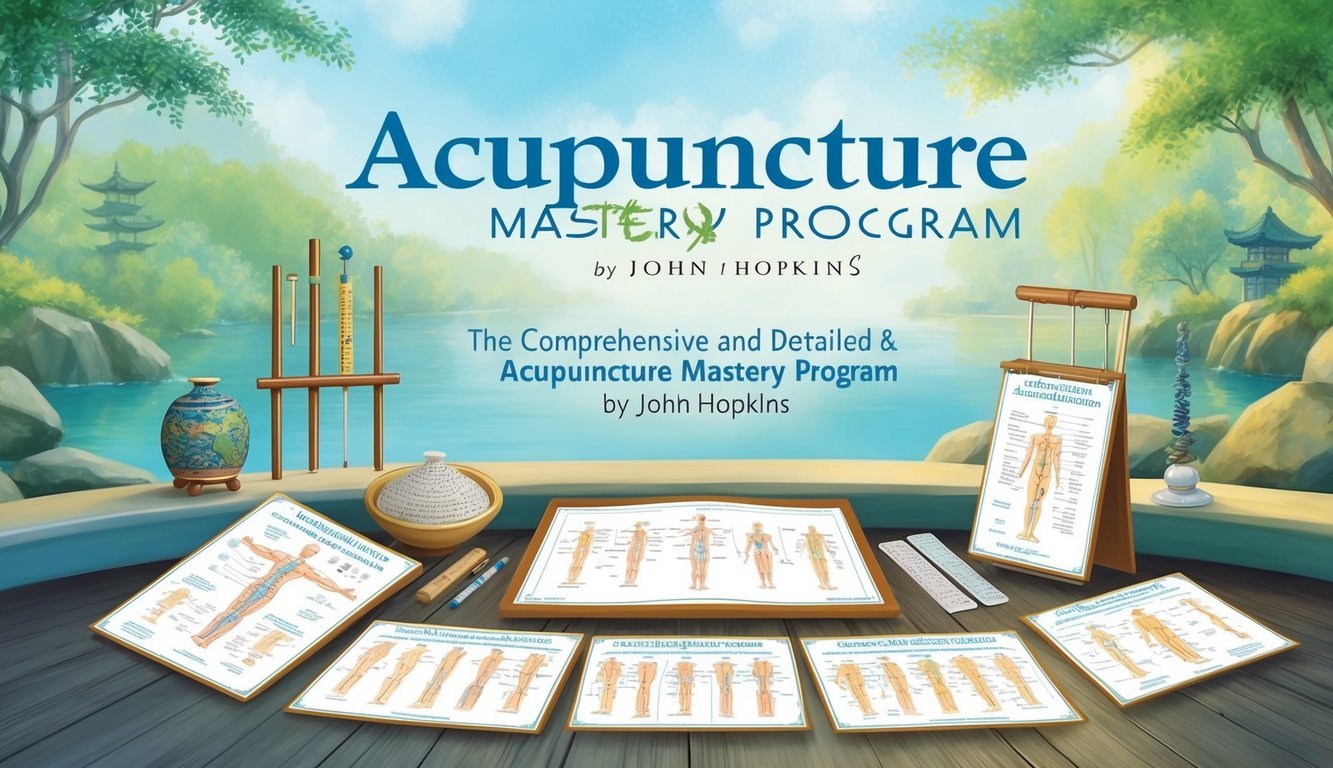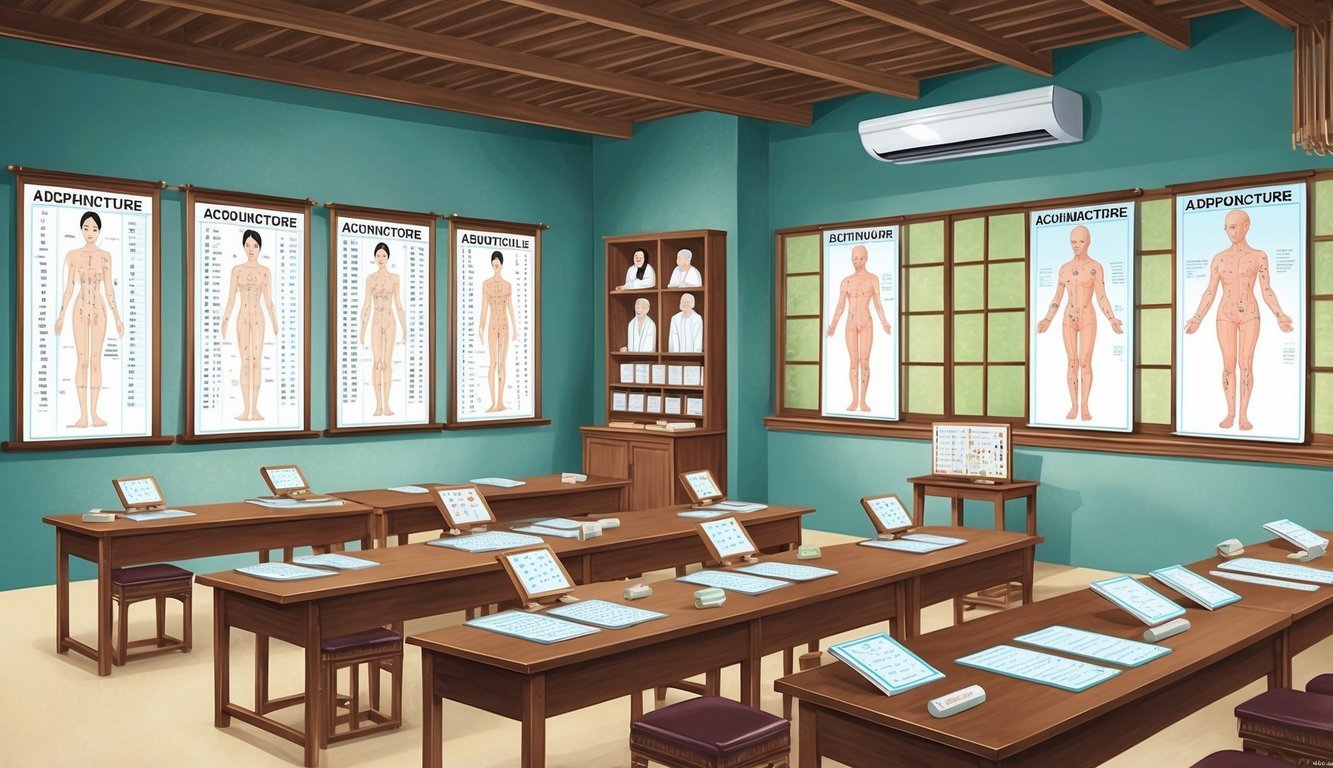Thinking about diving into acupuncture? You’re in luck! There are some fantastic courses out there that can teach you everything you need to know about this ancient healing art.
From the basics to the advanced stuff, these programs have got you covered.

The best acupuncture courses offer a thorough look at both theory and hands-on practice. You’ll learn about Traditional Chinese Medicine, various styles of acupuncture, and how to handle needles safely.
Some programs even throw in extra goodies like herbal remedies and massage techniques.
It’s kind of amazing what you can pick up in just one program!
1) Acupuncture Mastery Program by Johns Hopkins

Want to learn from the best? Check out the Acupuncture Mastery Program at Johns Hopkins.
This top-tier course will walk you through the ancient practice of acupuncture, which involves placing tiny needles into your skin to help with a variety of health issues.
Ever wondered how sticking needles in your skin can change how you feel? The course dives into “qi”—that’s the energy that moves throughout your body along pathways called meridians.
Understanding this concept is key to unlocking its benefits.
You won’t just be stuck in lectures; expect hands-on practice.
You’ll actually get to place those fine needles on specific points on the skin.
And honestly, it’s not as scary as it sounds! Trust me, you’ll come out of this feeling pretty empowered.
By the end, you’ll grasp how acupuncture can help with a range of health problems.
Plus, you’re learning from some of the top professionals in the field at Johns Hopkins.
Pretty cool, right?
2) Yin Yang Balance Workshop by Lisa Chen
If you want to really grasp the concepts of Yin and Yang in acupuncture, Lisa Chen’s workshop might be just what you need.
This comprehensive course breaks down the basics of Yin and Yang theory in Traditional Chinese Medicine.
You’ll discover how these opposing forces create balance in the body.
In Chen’s workshop, you’ll get hands-on practice applying these concepts in acupuncture.
You’ll learn how to use needles to regulate Qi flow and promote harmony for your patients.
But that’s not all.
The course also dives into advanced combinations of acupuncture points, and you’ll tackle real-life case studies.
This practical experience will help you create customized treatment plans to meet individual patient needs, ensuring you’re well-prepped for whatever challenges your health career might throw your way.
By the time you finish, you’ll have a solid understanding of maintaining Yin Yang balance in your acupuncture practice.
This will put you in a great position to craft effective treatment plans for your clients.
3) Advanced Needle Techniques by Emma Li
Ready to up your acupuncture game? Emma Li’s Advanced Needle Techniques course might be exactly what you’re looking for.
This course goes beyond just the basics.
You’ll get to learn about exciting methods like electroacupuncture.
It’s not just about sticking needles in; it’s about making a real difference for your patients.
Expect a hands-on learning experience.
You’ll practice quite a bit, which is fantastic for building your confidence.
We all know that knowing the anatomy behind what you’re doing is super important, right?
Here’s the exciting part: you’ll learn to design treatments tailored for specific conditions.
This means you can offer help for various health issues.
If the science of acupuncture interests you, Emma’s course is a must.
It beautifully blends traditional wisdom with the latest research, leaving you with knowledge and skills that are far beyond what you started with.
4) Holistic Healing Seminar by Dr. Jenny Park

Dr. Jenny Park’s Holistic Healing Seminar could be a game-changer for anyone looking to become an acupuncturist.
This course takes a fun, fresh approach by blending traditional Chinese medicine with modern wellness practices.
You’ll explore how different body systems work together in the world of holistic healing.
No need to worry about complex concepts—Dr. Park has a knack for making even the toughest topics easy to understand.
Covering a wide array of subjects from acupuncture basics to advanced techniques, this seminar is packed.
You’ll also dive into topics like herbal remedies, nutrition, and the mind-body connection.
What really sets this course apart is the hands-on practice you’ll get under expert guidance.
You won’t just sit and listen; you’ll be applying what you learn.
Plus, Dr. Park doesn’t shy away from the business side of acupuncture.
She’ll give you tips and tricks on how to develop a successful practice and attract clients.
Whether you prefer online or in-person classes, this seminar has flexible options to suit busy schedules.
Understanding Acupuncture
Acupuncture is an ancient healing technique that uses thin needles to help balance energy in the body.
It comes with a rich history and works in ways that might surprise you!
History of Acupuncture
Believe it or not, acupuncture started in China over 2,000 years ago! Back then, people believed that illness stemmed from an imbalance of energy.
They mapped out specific spots where they could insert needles to address these issues.
Before long, acupuncture spread to neighboring countries like Korea and Japan.
It made its way to Europe in the 1600s, where it didn’t exactly win over Western doctors right away.
But now? It’s a popular practice all over the world!
In the 1970s, acupuncture gained fame in the US and can now be found in many hospitals and clinics.
Some health insurance plans even cover it!
How Acupuncture Works
Acupuncture involves using super-fine needles placed at specific spots on your body, connecting to energy pathways called meridians.
The idea is that these needles help unblock or redirect the energy flow.
When the needles go in, your body releases chemicals that can:
- Soften pain
- Help you chill out
- Boost your immune system
Scientific research is still working on the exact mechanisms, but studies suggest acupuncture can help with:
- Headaches
- Back pain
- Nausea
- Allergies
Most people feel a slight pinch when the needle goes in, but surprisingly, many find it quite relaxing! If you’re curious, acupuncture courses offer a great way to learn more about how it all works — from techniques to the underlying theories.
Choosing the Right Course

Choosing the right acupuncture course is essential for building your future career.
Let’s talk about a few key points to keep in mind for top-notch training.
Accreditation and Certification
When looking into acupuncture courses, make sure they’re accredited.
Accreditation means the school meets established quality standards, and that’s important since accredited programs are more likely recognized by employers and licensing boards.
Look for schools approved by the Accreditation Commission for Acupuncture and Oriental Medicine (ACAOM).
They set the standard for educational quality in this field.
Also, ensure the course prepares you for certification exams; passing these is necessary for practicing in most places.
It’s smart to ask about exam pass rates to gauge how well students are getting ready.
Curriculum and Skills Covered
The content of the course is super important.
You want to be sure you’re learning everything you’ll need.
A good acupuncture program should include:
- Theory of Traditional Chinese Medicine
- Point location and needling techniques
- Herbal medicine
- Western medical concepts
- Clinical practice
Courses that focus on hands-on training are fantastic.
You’ll want to practice plenty before working on real people; some programs even offer internships or clinical rotations.
And if you plan on opening your own practice one day, check if the course covers business skills.
That can be a lifesaver!
Frequently Asked Questions

Acupuncture training comes in lots of flavors.
You might have questions about online options, top schools, or how to get certified.
Here are some common queries about acupuncture education.
What are the top online programs for learning acupuncture?
Finding online acupuncture programs can be tough.
Most schools require hands-on practice, but there are solid courses for learning theory online.
The Acupuncture Mastery Program by Johns Hopkins is a great place to start before you move onto in-person training.
Which acupuncture schools in the USA are known for their comprehensive training?
There are some excellent acupuncture schools in the USA! The Won Institute is known for its extensive program.
They teach various styles like Five Element and Traditional Chinese Medicine while incorporating Japanese and Korean techniques too!
Can I find high-quality acupuncture courses nearby for free?
Finding free, high-quality acupuncture courses is a bit like hunting for unicorns—rare! Most solid programs require a fee.
Still, you might come across introductory classes or workshops for free or at a lower cost.
It’s worth checking local community centers or acupuncture clinics!
What kind of acupuncture certification is available for healthcare professionals like physicians and nurses?
If you’re already in healthcare, lucky you! Many programs offer special tracks for doctors and nurses. AcuMed has courses specifically designed for medical professionals, often featuring online components and weekend webinars.
How does Eastern acupuncture differ from the practices in the West?
Eastern acupuncture is all about traditional Chinese medicine, focusing on energy flow and balance.
Western acupuncture often combines these ideas with modern medical insights.
The Yin Yang Balance Workshop by Lisa Chen digs into both approaches.
What qualifications should I look for in a school when aiming for the highest degree in acupuncture?
Keep an eye out for schools accredited by the ACAOM.
Check if they offer master’s or doctoral programs and make sure they incorporate both theory and hands-on training.
The Advanced Needle Techniques by Emma Li course is a good example of practical training in action.
And don’t forget to look for programs that include courses in herbal medicine, diagnostic techniques, and patient care.
That’ll give you a well-rounded education, and set you up for success in your acupuncture career!

